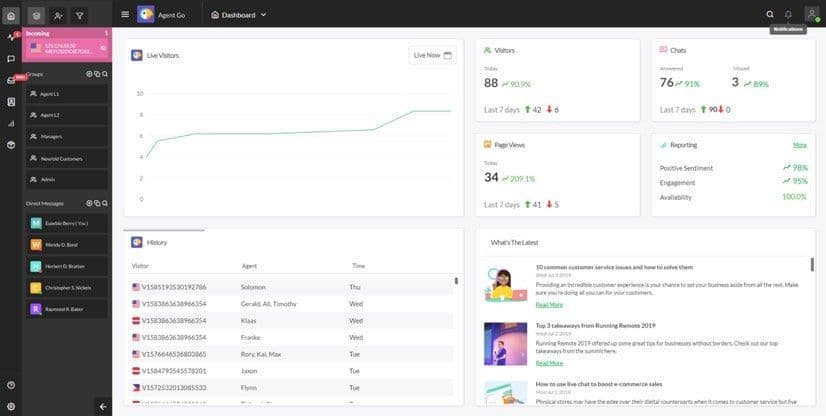chatbots
customer services
+ 4 more ...
Chatbots: 5 Questions & Answers
03 Jul 2020
by Lotte, Digital Content Specialist
03 Jul 2020
by Lotte, Digital Content Specialist
chatbots
customer services
automation
artificial intelligence
machine learning
user experience
Chatbots: 5 Questions & Answers
Table of contents
Contact us
We will get back to you in the next 48 hours.

Chatbots are an indispensable part of the current trend of digital transformations of businesses, check out why!
Chatbots, you see them appear on websites more and more often. You can ask them questions and they immediately refer you to a human agent that’ll answer your question, or they are so far developed they can answer your questions themselves using Artificial Intelligence and Machine Learning. As an increasing number of businesses go through a digital transformation, chatbots can’t be overlooked. Here are five questions and answers to get you up-to-speed about chatbots.
1. What are chatbots?
Chatbots are computer programs that provide the ability for humans to directly interact with technology by means of their voice, written text, gestures, or touches. Chatbots are often used as an addition to the customer services of big companies that have limited time and space to answer all incoming questions and remarks. However, more and more small and medium-sized companies also notice the benefits of implementing chatbots in order to help manage support and gather useful insights from their end-users and customers. Chatbots have different varying levels of intelligence, from live chats where a human is reading and replying to chats, to fully autonomous bots learning their own question/answering patterns.
2. How can chatbots improve customer services?
Not only do chatbots offer a simple option for visitors to quickly ask questions, they also optimize the reaction time for answering these questions. Live chatbots, which are backed up with real-life agents, are constantly being supervised, so all questions are answered as soon as possible, which is often not the case with extensive contact forms forwarding questions towards an already flooded mailbox.
In the case of fully autonomous chatbots, they are available 24/7, 365 days per year. This way, customers across the the entire world can access the service whenever they want, and get an immediate response. Next to that, fully automated chatbots have the ability to answer millions of conversations at the same time with the same standards, which would be impossible for human agents. Especially for bigger enterprises, this can immensely improve the quality of their customer services.
3. What are the current limitations of chatbots?
The main difference between human-controlled customer service and a fully automated chatbot is the quality of the answer. Chatbots that haven’t built up a database of questions and fitting answers yet are often struggling with providing the customer with a complete and valuable answer. Whereas humans, who can think for themselves, are much more capable of responding with an answer that is perfectly aligned with the question. Chatbots have to specifically search for certain keywords in a question, but if the customer doesn’t provide those keywords, the AI-driven chatbot will have a hard time handling the request and returning a fitting answer.
Additionally, even the best chatbots are still dependent on humans. For example, they need to be able to read multiple languages in order to provide a good service to customers from all corners of the world. Most chatbot development technologies are dependent on a lot of human effort before they are able to provide a high-quality service. And designing and developing an autonomous chatbot system requires a deeply-rooted knowledge of machine learning. In other words, there’s a lot that needs to be done before an AI-driven chatbot is able to truly optimize customer services.
4. What are the best chatbots on the market right now?
Currently, an increasing number of businesses are becoming aware of the immense amounts of benefits of chatbots. This results in a sudden and fast growth of chatbot options on the market. For example, Spotify’s Facebook Messenger bot can answer customer’s questions for finding specific songs or recommending new content. Whereas Starbucks uses its in-app bot to order your favorite drink by voice command or text messaging. The chatbot keeps customers updated about the status of their order and the total cost. In order to get an insight into the current market of chatbots, we created a list with an overview of the most popular chatbots available on the market:
Dialogflow
Dialogflow can perhaps be seen as the crème de la crème of AI-powered chatbots on the market. The Dialogflow system integrates both voice and text AI technologies to virtual assistants like Google Assistant, Microsoft Cortana and Amazon Alexa. The chatbot is used on widely popular messaging and social media platforms like Facebook Messenger, Twitter, Telegram, Slack, and Skype. Using years of experience in Natural Language Processing, Dialogflow analyses and understands the user’s input and has the ability to reply in an almost flawless manner.
Tawk.to
Tawk.to is a free and customizable chatbot controlled and steered by human agents. It’s more of a messaging management system than a fully automated and AI-powered bot, which monitors your web-traffic in real-time and provides personalized customer services. Tawk.to offers fully customizable chat buttons to add to the user interface of your website, so it’ll always fit to the design of your brand. Users can click on the button and immediately send in their questions or remarks, after which employees receive a notification for a request for an answer.

Chatfuel
Chatfuel is a free chatbot functioning in Facebook Messenger, and helps businesses all over the world with the optimization of their customer service on Facebook. The AI-powered chatbot provides users with live updates on data and news to keep your users engaged and informed. Chatfuel offers a user-friendly and flexible custom coding experience, and requires no previous coding experience. Big brands like Adidas, LEGO, and T-Mobile are using Chatfuel in their Facebook Messenger customer service.
Bold 360
Bold 360 is another example of a chatbot that isn’t limited to pre-written scripts, but instead possesses the ability to use Natural Language Processing in order to personalise conversations with customers. Bold 360 can immediately be installed on your website, and doesn’t require knowledge of AI/ML programming. After installing the bot on your webpage, it slowly teaches itself to understand the human language and interact with customers in a human-like and genuine way.
Botsify
Botsify is a pricier, but highly developed chatbot. The bot is designed and developed to offer the best possible customer service, by immediately raising a flag when it’s unable to answer a customer’s question. Employees are instantly notified when this happens, and get the chance to answer the question for themselves. It’s the ultimate power of human and robot interaction. Botsify also provides feedback surveys, so your team has a constant insight into the overall performance of the chatbot.
5. What will the future of chatbots look like?
The digital transformation of businesses is going on in full speed, and more and more companies are slowly but steadily handing over certain tasks to machines. The automation of business processes leaves employees with more time for tasks that require their focus and attention. In the coming years, chatbots are expected to manage most customer services, and the human intermediary will eventually disappear. Future chatbots will become increasingly better equipped for handling human-like engagements and conversations with customers. They will be able to not only respond to questions but also predict incidents and provide immediate solutions.
At Lizard Global, we understand the importance of good customer service, and we gladly help you during the process of the digital transformation of your business. Our skilled team is experienced in every aspect of business process automation, including the use and appliance of chatbots. Curious? Drop us a line, or contact us via our Tawk.to button in the bottom right corner of your screen!

Chatbots are an indispensable part of the current trend of digital transformations of businesses, check out why!
Chatbots, you see them appear on websites more and more often. You can ask them questions and they immediately refer you to a human agent that’ll answer your question, or they are so far developed they can answer your questions themselves using Artificial Intelligence and Machine Learning. As an increasing number of businesses go through a digital transformation, chatbots can’t be overlooked. Here are five questions and answers to get you up-to-speed about chatbots.
1. What are chatbots?
Chatbots are computer programs that provide the ability for humans to directly interact with technology by means of their voice, written text, gestures, or touches. Chatbots are often used as an addition to the customer services of big companies that have limited time and space to answer all incoming questions and remarks. However, more and more small and medium-sized companies also notice the benefits of implementing chatbots in order to help manage support and gather useful insights from their end-users and customers. Chatbots have different varying levels of intelligence, from live chats where a human is reading and replying to chats, to fully autonomous bots learning their own question/answering patterns.
2. How can chatbots improve customer services?
Not only do chatbots offer a simple option for visitors to quickly ask questions, they also optimize the reaction time for answering these questions. Live chatbots, which are backed up with real-life agents, are constantly being supervised, so all questions are answered as soon as possible, which is often not the case with extensive contact forms forwarding questions towards an already flooded mailbox.
In the case of fully autonomous chatbots, they are available 24/7, 365 days per year. This way, customers across the the entire world can access the service whenever they want, and get an immediate response. Next to that, fully automated chatbots have the ability to answer millions of conversations at the same time with the same standards, which would be impossible for human agents. Especially for bigger enterprises, this can immensely improve the quality of their customer services.
3. What are the current limitations of chatbots?
The main difference between human-controlled customer service and a fully automated chatbot is the quality of the answer. Chatbots that haven’t built up a database of questions and fitting answers yet are often struggling with providing the customer with a complete and valuable answer. Whereas humans, who can think for themselves, are much more capable of responding with an answer that is perfectly aligned with the question. Chatbots have to specifically search for certain keywords in a question, but if the customer doesn’t provide those keywords, the AI-driven chatbot will have a hard time handling the request and returning a fitting answer.
Additionally, even the best chatbots are still dependent on humans. For example, they need to be able to read multiple languages in order to provide a good service to customers from all corners of the world. Most chatbot development technologies are dependent on a lot of human effort before they are able to provide a high-quality service. And designing and developing an autonomous chatbot system requires a deeply-rooted knowledge of machine learning. In other words, there’s a lot that needs to be done before an AI-driven chatbot is able to truly optimize customer services.
4. What are the best chatbots on the market right now?
Currently, an increasing number of businesses are becoming aware of the immense amounts of benefits of chatbots. This results in a sudden and fast growth of chatbot options on the market. For example, Spotify’s Facebook Messenger bot can answer customer’s questions for finding specific songs or recommending new content. Whereas Starbucks uses its in-app bot to order your favorite drink by voice command or text messaging. The chatbot keeps customers updated about the status of their order and the total cost. In order to get an insight into the current market of chatbots, we created a list with an overview of the most popular chatbots available on the market:
Dialogflow
Dialogflow can perhaps be seen as the crème de la crème of AI-powered chatbots on the market. The Dialogflow system integrates both voice and text AI technologies to virtual assistants like Google Assistant, Microsoft Cortana and Amazon Alexa. The chatbot is used on widely popular messaging and social media platforms like Facebook Messenger, Twitter, Telegram, Slack, and Skype. Using years of experience in Natural Language Processing, Dialogflow analyses and understands the user’s input and has the ability to reply in an almost flawless manner.
Tawk.to
Tawk.to is a free and customizable chatbot controlled and steered by human agents. It’s more of a messaging management system than a fully automated and AI-powered bot, which monitors your web-traffic in real-time and provides personalized customer services. Tawk.to offers fully customizable chat buttons to add to the user interface of your website, so it’ll always fit to the design of your brand. Users can click on the button and immediately send in their questions or remarks, after which employees receive a notification for a request for an answer.

Chatfuel
Chatfuel is a free chatbot functioning in Facebook Messenger, and helps businesses all over the world with the optimization of their customer service on Facebook. The AI-powered chatbot provides users with live updates on data and news to keep your users engaged and informed. Chatfuel offers a user-friendly and flexible custom coding experience, and requires no previous coding experience. Big brands like Adidas, LEGO, and T-Mobile are using Chatfuel in their Facebook Messenger customer service.
Bold 360
Bold 360 is another example of a chatbot that isn’t limited to pre-written scripts, but instead possesses the ability to use Natural Language Processing in order to personalise conversations with customers. Bold 360 can immediately be installed on your website, and doesn’t require knowledge of AI/ML programming. After installing the bot on your webpage, it slowly teaches itself to understand the human language and interact with customers in a human-like and genuine way.
Botsify
Botsify is a pricier, but highly developed chatbot. The bot is designed and developed to offer the best possible customer service, by immediately raising a flag when it’s unable to answer a customer’s question. Employees are instantly notified when this happens, and get the chance to answer the question for themselves. It’s the ultimate power of human and robot interaction. Botsify also provides feedback surveys, so your team has a constant insight into the overall performance of the chatbot.
5. What will the future of chatbots look like?
The digital transformation of businesses is going on in full speed, and more and more companies are slowly but steadily handing over certain tasks to machines. The automation of business processes leaves employees with more time for tasks that require their focus and attention. In the coming years, chatbots are expected to manage most customer services, and the human intermediary will eventually disappear. Future chatbots will become increasingly better equipped for handling human-like engagements and conversations with customers. They will be able to not only respond to questions but also predict incidents and provide immediate solutions.
At Lizard Global, we understand the importance of good customer service, and we gladly help you during the process of the digital transformation of your business. Our skilled team is experienced in every aspect of business process automation, including the use and appliance of chatbots. Curious? Drop us a line, or contact us via our Tawk.to button in the bottom right corner of your screen!







